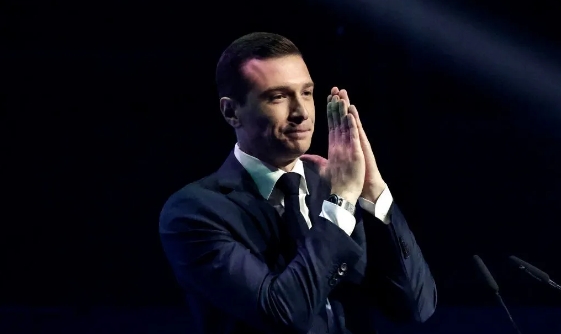The radical Right is winning on TikTok It amplifies a growing sense of anger and resentment

TKFFF · 2024-06-11 16:55
 Earlier this year, I predicted that 2024 would be the year of Zoomer race politics. At the time, I didn’t suspect that the first and most marked electoral evidence of this shift would come from France. But over the weekend the hard-Right French party Rassemblement National (RN) won some 32% of the total French vote in the European elections: a sharp increase on their 2019 score. Macron’s centrist Renaissance party, meanwhile, scored less than half of that number — prompting him to dissolve France’s National Assembly and call a snap national.
The sharp Rightward tilt was by no means confined to France. Social democrats and liberals across Europe took a hammering. But in a round of elections whose three most salient features were the mainstreaming of Right-wing youth radicalism, the political impact of TikTok, and the generalisation of anti-immigrant sentiment, the French result was the starkest. No wonder: its principal figurehead brings all these developments together in one unsettlingly potent package.
Jordan Bardella is the 28-year-old President of the RN, after taking over from Marine Le Pen in 2022. Bardella boasts 1.5 million followers on TikTok, where he posts clips of himself making the kind of statements that, in the UK, would be confined to anonymous Twitter accounts, and yet in France seem only to propel him to ever greater fame.
His account is far from the only one on TikTok that feels politically decisive, at least for Right-wing insurgents. Trump’s sole TikTok post garnered him over 6 million followers. And a six-second TikTok clip of Nigel Farage in a shopping centre, saying “lovely melons”, currently has over 2 million views. Whether this phenomenon is a reflection of, or an effort to encourage, the political participation of Gen Z is hard to say. But whichever way the causality runs, the tilt from written to video communication is empowering a new kind of politician.
TikTok, when applied to political discourse, takes the already-hyperactive 24-hour news cycle, then sticks it on radically crowdsourced, swivel-eyed ADHD fast-forward. In this breakneck, breathless, reckless environment, no one makes waves without that indefinable magic that causes people to remember you. The kids call this “rizz”; in old money, it’s box office power, the magnetism of a saint or celebrity.
“We can expect the new centrality of visual appearance, charisma, and emotive viral messaging to intensify polarisation.”
Boris had it; so does Farage, and — outside Europe — the controversial Nayyib Bukele, in El Salvador. As does Bardella. And what’s striking about the new TikTok politics he exemplifies is how it both conveys less, but also more. Policy platforms are simplified; long-form thinking or debate are nigh-on impossible. But where it’s about identity and belonging, a video can convey more visually in a few seconds than I could in a thousand written words.
This capacity for instant eloquence is used to powerful effect by the RN, as by other Right-wing insurgent parties, to convey tribal markers for their target demographics. In one recent “get out the vote” video, for example, Bardella captures provincial bourgeois Frenchness purely via his and Marine Le Pen’s appearance and backdrop, employing an aesthetic and context that will be instantly recognisable to the RN’s longstanding base of struggling small shopkeepers, the rural poor, and those fleeing high-immigration banlieues for the countryside.
The world they reference is one in which I spent time as a child, at a French school, supplemented by many subsequent visits. Not the stereotypical movie Frenchness of femmes fatales, romance, and baguettes, but a small-town, small-c conservative one of social convention, elaborate bureaucracy, and fierce pride in the minute details of regional culture. Denizens of this France have long been treated dismissively as moribund, ageing and irrelevant: the equivalent of the Brexiteers in England sneered at as “gammons”. In retaliation, they have voted in increasing numbers for successive Le Pen political vehicles, from Jean-Marie Le Pen’s long stint in the relative wilderness as a radioactive far-Right fringe figure, to Marine Le Pen’s first-round knockout at the Presidential elections in 2012, then 34% of the second-round vote in 2017, and 41% in 2022.
And increasingly, these older generations are joined by a younger and more net-native cohort, as polls and reports indicate that a significant proportion of Sunday’s Right-wing votes came from the young. Not so long ago, even conservatives believed this an impossibility: it was widely seen as axiomatic that every generation would lean further Left than the last. European think-tanks have been reporting for some time that the young are increasingly authoritarian; but perhaps it’s most accurate to say they’re more radical than their elders, including on the Right.
This should come as no surprise. Across Europe, as in the UK, a generation too young to remember the relative peace and prosperity of the Nineties has spent their whole adult lives amid the international polycrisis that began with the attack on the Twin Towers and escalated with the global financial crash. That’s been supplemented by rising climate anxiety, flattened wages, rocketing costs, migrant crises, and two years of pandemic. In this context, a social contract that appeared settled during my childhood is visibly unravelling, to the most obvious detriment of the young. Across Europe, economic stagnation, widening inequality, the unequal impacts of Net Zero policies, plus intensifying competition for scarce and expensive housing have all cumulatively fuelled a sense of intergenerational injustice and competition for dwindling resources.
This fusillade of bleak news affords the worst imaginable backdrop for the concurrent Europe-wide acceleration in net immigration. And while some youth have responded by breaking Left, a growing subset views immigration as the central cause and driver of their woes. For the non-elite youth dwelling in what Le Monde recently described as the “France of the forgotten”, for example, France (or indeed their England, or Germany, or Belgium) is a place of shrinking opportunities, rising costs, decaying infrastructure, and rural alienation. And its younger members feel as though they’re invisible, lost between the comfortable moral certainties of wealthy urban progressives, and a perceived influx of queue-jumping migrants with whom, increasingly, they experience themselves as competing for resources.
Now, every time the press reports an instance of intra-ethnic violence, the sense of grievance and injustice grows more intense. Bardella leans with casual insistence into the resulting anger and resentment: in April, for example, he responded to the murder of 15-year-old Matisse Marchais by an Afghan migrant, by calling Marchais “a victim of a senseless, uncontrolled immigration politics”. When another Afghan stabbed two others, killing one, for drinking alcohol during Eid, Bardella called it an “ensavaging” of French national life and warning about the encroachment of Islam.
Nor, as the Sorbonne-educated Bardella indicates, is this even confined to the poor and under-educated — or indeed to France. Recent uproar in Germany about the viral spread of an anti-immigration version of the Europop anthem L’Amour Toujours from East German warehouse parties to upscale Sylt parties suggests that European nativism is not, as the progressives insist, the sole preserve of the “left-behind” in other European countries either.
Should the RN perform well in the 30 June snap elections, Bardella will be their pick for Prime Minister, putting an anti-immigration millennial whose enemies describe him as “heir to the Nazis” at least within eyeshot of serious political power in France. So does this mean, as some commentators have asserted, that Europe is about to fall to a new generation of crypto-fascists? Or, conversely, that those Right-wing Brits who voted Leave because the EU was too institutionally progressive should (as a few wags have already suggested) now campaign to rejoin the EU?
Perhaps not; the core aim of EU technocracy is, after all, draining the radicalism out of politics. There was a hue and cry about “the far Right” when Giorgia Meloni was elected in Italy in 2022, but since then, she has disappointed her voters with a public debt that continues to rise, all while U-turning on immigration. By the same token, even if Bardella did succeed in attaining high office, he would probably end up disappointing his fans simply by dint of shifting from the nuance-free vibes-based register of TikTok signalling to the crunchy, real-world one of policy and the “art of the possible”.
But even if the EU election results are unlikely to deliver the kind of radical change young Right-wingers evidently crave, their significance is hard to exaggerate — simply in what it indicates about European public opinion. For even if, as I’ve argued, politics is already functionally post-democratic across the developed world, in any relatively stable polity the views of the masses matter at least somewhat, democracy or no democracy. And with platforms such as TikTok now emerging as vehicles for a style of activism that captures and intensifies the views of electorally under-represented political interests, even so well-insulated a group of technocrats as the EU Commission may find these difficult to ignore.
As as long as TikTok is part of the landscape, we can expect short-form, primarily visual, algorithm-driven and increasingly tribal political movements to play a central role in the public square. We can expect the new centrality of visual appearance, charisma, and emotive viral messaging to intensify polarisation. There is, after all, little room on TikTok for long-form policy development, civil debate, or even judging people by the content of their character rather than the colour of their skin.
So buckle up: Gen-Z radicalism is here to stay. The arc of their history is, it turns out, short-form and viral. And right now, it bends sharply to the Right.
Earlier this year, I predicted that 2024 would be the year of Zoomer race politics. At the time, I didn’t suspect that the first and most marked electoral evidence of this shift would come from France. But over the weekend the hard-Right French party Rassemblement National (RN) won some 32% of the total French vote in the European elections: a sharp increase on their 2019 score. Macron’s centrist Renaissance party, meanwhile, scored less than half of that number — prompting him to dissolve France’s National Assembly and call a snap national.
The sharp Rightward tilt was by no means confined to France. Social democrats and liberals across Europe took a hammering. But in a round of elections whose three most salient features were the mainstreaming of Right-wing youth radicalism, the political impact of TikTok, and the generalisation of anti-immigrant sentiment, the French result was the starkest. No wonder: its principal figurehead brings all these developments together in one unsettlingly potent package.
Jordan Bardella is the 28-year-old President of the RN, after taking over from Marine Le Pen in 2022. Bardella boasts 1.5 million followers on TikTok, where he posts clips of himself making the kind of statements that, in the UK, would be confined to anonymous Twitter accounts, and yet in France seem only to propel him to ever greater fame.
His account is far from the only one on TikTok that feels politically decisive, at least for Right-wing insurgents. Trump’s sole TikTok post garnered him over 6 million followers. And a six-second TikTok clip of Nigel Farage in a shopping centre, saying “lovely melons”, currently has over 2 million views. Whether this phenomenon is a reflection of, or an effort to encourage, the political participation of Gen Z is hard to say. But whichever way the causality runs, the tilt from written to video communication is empowering a new kind of politician.
TikTok, when applied to political discourse, takes the already-hyperactive 24-hour news cycle, then sticks it on radically crowdsourced, swivel-eyed ADHD fast-forward. In this breakneck, breathless, reckless environment, no one makes waves without that indefinable magic that causes people to remember you. The kids call this “rizz”; in old money, it’s box office power, the magnetism of a saint or celebrity.
“We can expect the new centrality of visual appearance, charisma, and emotive viral messaging to intensify polarisation.”
Boris had it; so does Farage, and — outside Europe — the controversial Nayyib Bukele, in El Salvador. As does Bardella. And what’s striking about the new TikTok politics he exemplifies is how it both conveys less, but also more. Policy platforms are simplified; long-form thinking or debate are nigh-on impossible. But where it’s about identity and belonging, a video can convey more visually in a few seconds than I could in a thousand written words.
This capacity for instant eloquence is used to powerful effect by the RN, as by other Right-wing insurgent parties, to convey tribal markers for their target demographics. In one recent “get out the vote” video, for example, Bardella captures provincial bourgeois Frenchness purely via his and Marine Le Pen’s appearance and backdrop, employing an aesthetic and context that will be instantly recognisable to the RN’s longstanding base of struggling small shopkeepers, the rural poor, and those fleeing high-immigration banlieues for the countryside.
The world they reference is one in which I spent time as a child, at a French school, supplemented by many subsequent visits. Not the stereotypical movie Frenchness of femmes fatales, romance, and baguettes, but a small-town, small-c conservative one of social convention, elaborate bureaucracy, and fierce pride in the minute details of regional culture. Denizens of this France have long been treated dismissively as moribund, ageing and irrelevant: the equivalent of the Brexiteers in England sneered at as “gammons”. In retaliation, they have voted in increasing numbers for successive Le Pen political vehicles, from Jean-Marie Le Pen’s long stint in the relative wilderness as a radioactive far-Right fringe figure, to Marine Le Pen’s first-round knockout at the Presidential elections in 2012, then 34% of the second-round vote in 2017, and 41% in 2022.
And increasingly, these older generations are joined by a younger and more net-native cohort, as polls and reports indicate that a significant proportion of Sunday’s Right-wing votes came from the young. Not so long ago, even conservatives believed this an impossibility: it was widely seen as axiomatic that every generation would lean further Left than the last. European think-tanks have been reporting for some time that the young are increasingly authoritarian; but perhaps it’s most accurate to say they’re more radical than their elders, including on the Right.
This should come as no surprise. Across Europe, as in the UK, a generation too young to remember the relative peace and prosperity of the Nineties has spent their whole adult lives amid the international polycrisis that began with the attack on the Twin Towers and escalated with the global financial crash. That’s been supplemented by rising climate anxiety, flattened wages, rocketing costs, migrant crises, and two years of pandemic. In this context, a social contract that appeared settled during my childhood is visibly unravelling, to the most obvious detriment of the young. Across Europe, economic stagnation, widening inequality, the unequal impacts of Net Zero policies, plus intensifying competition for scarce and expensive housing have all cumulatively fuelled a sense of intergenerational injustice and competition for dwindling resources.
This fusillade of bleak news affords the worst imaginable backdrop for the concurrent Europe-wide acceleration in net immigration. And while some youth have responded by breaking Left, a growing subset views immigration as the central cause and driver of their woes. For the non-elite youth dwelling in what Le Monde recently described as the “France of the forgotten”, for example, France (or indeed their England, or Germany, or Belgium) is a place of shrinking opportunities, rising costs, decaying infrastructure, and rural alienation. And its younger members feel as though they’re invisible, lost between the comfortable moral certainties of wealthy urban progressives, and a perceived influx of queue-jumping migrants with whom, increasingly, they experience themselves as competing for resources.
Now, every time the press reports an instance of intra-ethnic violence, the sense of grievance and injustice grows more intense. Bardella leans with casual insistence into the resulting anger and resentment: in April, for example, he responded to the murder of 15-year-old Matisse Marchais by an Afghan migrant, by calling Marchais “a victim of a senseless, uncontrolled immigration politics”. When another Afghan stabbed two others, killing one, for drinking alcohol during Eid, Bardella called it an “ensavaging” of French national life and warning about the encroachment of Islam.
Nor, as the Sorbonne-educated Bardella indicates, is this even confined to the poor and under-educated — or indeed to France. Recent uproar in Germany about the viral spread of an anti-immigration version of the Europop anthem L’Amour Toujours from East German warehouse parties to upscale Sylt parties suggests that European nativism is not, as the progressives insist, the sole preserve of the “left-behind” in other European countries either.
Should the RN perform well in the 30 June snap elections, Bardella will be their pick for Prime Minister, putting an anti-immigration millennial whose enemies describe him as “heir to the Nazis” at least within eyeshot of serious political power in France. So does this mean, as some commentators have asserted, that Europe is about to fall to a new generation of crypto-fascists? Or, conversely, that those Right-wing Brits who voted Leave because the EU was too institutionally progressive should (as a few wags have already suggested) now campaign to rejoin the EU?
Perhaps not; the core aim of EU technocracy is, after all, draining the radicalism out of politics. There was a hue and cry about “the far Right” when Giorgia Meloni was elected in Italy in 2022, but since then, she has disappointed her voters with a public debt that continues to rise, all while U-turning on immigration. By the same token, even if Bardella did succeed in attaining high office, he would probably end up disappointing his fans simply by dint of shifting from the nuance-free vibes-based register of TikTok signalling to the crunchy, real-world one of policy and the “art of the possible”.
But even if the EU election results are unlikely to deliver the kind of radical change young Right-wingers evidently crave, their significance is hard to exaggerate — simply in what it indicates about European public opinion. For even if, as I’ve argued, politics is already functionally post-democratic across the developed world, in any relatively stable polity the views of the masses matter at least somewhat, democracy or no democracy. And with platforms such as TikTok now emerging as vehicles for a style of activism that captures and intensifies the views of electorally under-represented political interests, even so well-insulated a group of technocrats as the EU Commission may find these difficult to ignore.
As as long as TikTok is part of the landscape, we can expect short-form, primarily visual, algorithm-driven and increasingly tribal political movements to play a central role in the public square. We can expect the new centrality of visual appearance, charisma, and emotive viral messaging to intensify polarisation. There is, after all, little room on TikTok for long-form policy development, civil debate, or even judging people by the content of their character rather than the colour of their skin.
So buckle up: Gen-Z radicalism is here to stay. The arc of their history is, it turns out, short-form and viral. And right now, it bends sharply to the Right.
文章来源:unherd


TKFFF公众号
扫码关注领【TK运营地图】

TKFFF合作,请扫码联系!

文章来源: 文章该内容为作者观点,TKFFF仅提供信息存储空间服务,不代表TKFFF的观点或立场。版权归原作者所有,未经允许不得转载。对于因本网站图片、内容所引起的纠纷、损失等,TKFFF均不承担侵权行为的连带责任。如发现本站文章存在版权问题,请联系:1280199022@qq.com
分享给好友:
















